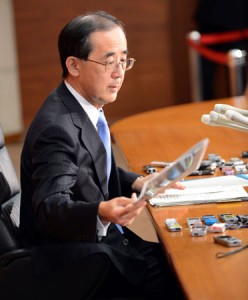Japan posts worst October trade data in three decades

Governor of the Bank of Japan (BOJ) Masaaki Shirakawa takes his seat to start his monthly press conference at its headquarters in Tokyo on November 20, 2012. AFP
TOKYO—Japan on Wednesday posted its worst October trade figures in more than 30 years, underscoring persistent weakness in the world’s third-largest economy amid the global slowdown and a spat with China.
Finance ministry data showed last month’s trade deficit nearly doubled to $6.7 billion from a year ago, coming on top of weakening factory output and after Japan’s economy shrank in the latest quarter, nudging it towards recession.
The poor figures have heaped pressure on the Bank of Japan to launch further easing measures to stoke the economy, with main opposition leader Shinzo Abe saying he wanted the central bank to buy government bonds if elected.
The central bank, however, held off fresh policy action and kept rates steady on Tuesday, with BoJ Governor Masaaki Shirakawa dismissing the proposals from Abe, tipped to become Japan’s next prime minister in December’s elections.
But the bank also warned that Japan’s economy “is expected to remain relatively weak for the time being”.
“There remains a high degree of uncertainty,” it added.
October’s trade shortfall came to 549 billion yen, expanding from a year-earlier deficit of 283 billion yen as exports fell 6.5 percent.
That marked Japan’s worst October trade figures for the month since 1979, when comparable data became available, and the country’s fourth consecutive monthly deficit.
October shipments to China were off 11.6 percent, with exports of cars plunging 82 percent as demand was hit by a consumer boycott following Tokyo’s nationalisation in September of an East China Sea island chain claimed by Japan and China.
Japan’s top three automakers — Toyota, Nissan and Honda — have all reported that the row with China has dug into their sales and profits, while major electronics producers have also been sideswiped by fallout from the spat.
“The impact (of the China row) on exports is significant, especially on those of automobiles,” Yoshimasa Maruyama, senior economist at Itochu Corp., told Dow Jones Newswires.
Imports during the period were down 1.6 percent from a year ago, but Japan has seen its energy bills soar since shutting its nuclear plants after last year’s Fukushima atomic crisis.
Nuclear power once supplied about one-third of Japan’s electricity needs.
Only two of its 50 reactors are currently in operation, with the nation turning to pricey fossil-fuel alternatives to plug the energy gap.
Japan’s economy has been hit by a litany of problems, including an export-denting strong yen and a fall-off in demand in debt-riddled Europe, with shipments to the European Union falling 20.1 percent in October.
Exports to the key North American market were 3.4 percent higher while shipments to Asia — including China, South Korea, Indonesia, Taiwan and India — were down 4.9 percent as demand slowed in a region that has been a crucial driver of global growth.